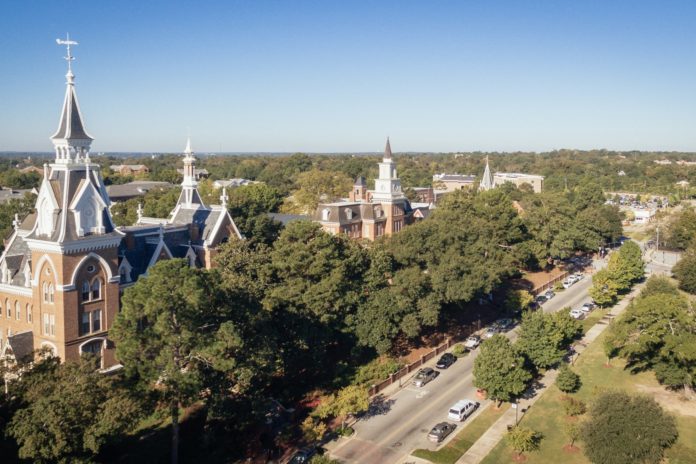MACON — Dr. Francis Collins, author of The Language of God: A Scientist Presents Evidence for Belief, will be the first speaker in Mercer University’s President’s Lecture Series. Collins will speak in Willingham Auditorium on Mercer’s Macon campus at 3 p.m. on Wednesday, April 4.
The event is free and open to the public, but seating is limited.
In recent years, a number of prominent scientists have written books condemning belief in God, and religion in general, based on their examination of scientific evidence. Similarly, many religious groups have rejected scientific conclusions because they believe they are incompatible with faith in God and belief in the Bible. However, Collins’ work as a scientist and doctor, as well as the leader of the Human Genome Project, has strengthened his own faith in both God and science. In his book, The Language of God, Collins concludes that faith in God and faith in science can be harmonious. Released in 2006, Collins’ book has been on a number of best-seller lists, and Collins will bring his views on “The Language of God” to the campus of Mercer University.
“I am very pleased that Dr. Collins accepted our invitation to inaugurate this new lecture series,” said President William D. Underwood. “Our country has become increasingly polarized on matters of science and religion. Against this backdrop Dr. Collins offers a much-needed voice of reason and reconciliation.”
Collins is director of the National Human Genome Research Institute at the National Institutes of Health in Bethesda, Md. In this capacity, he oversaw the International Human Genome Sequencing Consortium, and its landmark effort to sequence the entire human DNA code, commonly referred to as the Human Genome Project. Building on the foundation laid by the project, Collins is now leading efforts to ensure that this new trove of sequence data is translated into powerful tools and thoughtful strategies to advance biological knowledge and improve human health.
Collins obtained his undergraduate degree in chemistry at the University of Virginia, and went on to obtain a Ph.D. in physical chemistry at Yale University. Recognizing that a revolution was beginning in molecular biology and genetics, he changed fields and enrolled in medical school at the University of North Carolina. He continued in Chapel Hill for his residency and chief residency in internal medicine. Dr. Collins then returned to Yale for a fellowship in human genetics, where he worked on methods of crossing large stretches of DNA to identify disease genes. He continued to develop these ideas after joining the faculty at the University of Michigan in 1984, and later coined the term “positional cloning” to describe the technique. This strategy has now become a fundamental approach to identifying disease genes in the absence of known functional abnormalities, and is a powerful component of modern molecular genetics. His laboratories at the University of Michigan and the National Institutes of Health have discovered a number of important genes, including those responsible for cystic fibrosis, neurofibromatosis, Huntington’s disease and most recently, the gene that causes Hutchinson-Gilford progeria syndrome, a dramatic form of premature aging.
In addition to Collins’ scientific achievements, he is known for his continuing emphasis on the importance of ethical and legal issues in genetics. He has been a strong advocate for protecting the privacy of genetic information and has served as a national leader in efforts to prohibit gene-based insurance and employment discrimination. His accomplishments have been recognized by election to the Institute of Medicine and the National Academy of Sciences.
About Mercer University:
Founded in 1833, Mercer University is a dynamic and comprehensive center of undergraduate, graduate and professional education. The University has 7,300 students; 11 schools and colleges – liberal arts, law, pharmacy, medicine, business, engineering, education, theology, music, nursing and continuing and professional studies; major campuses in Macon and Atlanta; four regional academic centers across the state; a university press; two teaching hospitals — Memorial Health University Medical Center and the Medical Center of Central Georgia; educational partnerships with Warner Robins Air Logistics Center in Warner Robins and Piedmont Healthcare in Atlanta; an engineering research center in Warner Robins; a performing arts center in Macon; and a NCAA Division I athletic program. For more information, visit www.mercer.edu.









